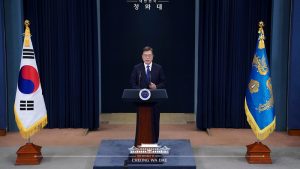The approval rate for South Korea’ main opposition United Future Party (UFP) have surpassed those of the ruling Democratic Party of Korea (DPK) for the first time in four years. According to the latest poll conducted by Realmeter, approval rates for the UFP stood at 36.5 percent, with the DPK at 33.4 percent.
The conservative UFP has been struggling to gain public support, especially after the impeachment of former President Park Geun-hye, who was the head of the conservative party in its previous avatar as Saenuri. The last time UFP (known as the Liberty Korea Party from February 2017 to February 2020) was more popular than the DPK was in October 2016, when its approval rate was 0.4 percentage point higher than the DPK’s. The Park scandal broke in late October of that year, and the party, despite its rebranding attempts, had trailed the DPK ever since – until now.
The change in sentiment comes amid widespread and still growing public anger over the government’s failure to stabilize real estate market prices. The government has tried. It has introduced more than 20 rounds of cooling measures in the past three years, but none of them has borne fruit.
The government and the DPK have again announced further measures and plans to tighten the property market, eliciting concerns that the new policies were rushed through without proper vetting.
The plan to set up a “real estate market supervisory body,” one of the new measures the government plans to introduce, is also worrisome. The idea is to create a new government-backed body to oversee and control the real estate market. Such a move raises concerns that the government will adopt a political approach to what is, at heart, an economic problem.
Rather than coming up with more measures in a hurry, the government should take a step back and thoroughly review what should its next steps be to tackle the real estate market issue and regain public support.
The poll by Realmeter cited above also showed that the approval rate for President Moon Jae-in stood at 43.3 percent, down 0.6 points from the previous week. The figure was the lowest for Moon since the second week of October 2019 and has been gradually decreasing in recent weeks.
You would think these numbers would be alarming for the government and the ruling party, but the atmosphere is somewhat different. Commenting on the poll, a member of the DPK who refused to be named told the local press that the party recognizes the issue, but it believes housing prices will surely stabilize, so that the public anger will also gradually decrease.
Moon himself may share this optimistic view. He said on August 10 that the government and the ruling party have come up with all-out measures to deal with housing instability, adding that the rise in housing prices is calming down.
But his remarks seem to have little basis in fact. Under the current administration, the median price of apartments has jumped 52 percent, and deposit prices for apartments in Seoul have risen for 56 consecutive weeks. Small wonder Moon’s remarks about the market “calming down” have rubbed some the wrong way.
DPK lawmaker Park Ju-min also said in a Facebook post that he agrees with the president’s positive outlook on the real estate market, as the measures introduced by the government are going to work. Park predicted the steps would start showing their effects in late 2020 or early 2021.
But in the meantime, public discontent is rising. Over the past month there have been more than four protests held in Seoul criticizing the government’s approach to the real estate market, each gathering hundreds of protesters. Demonstrators are planning a large-scale demonstration on August 15.

































